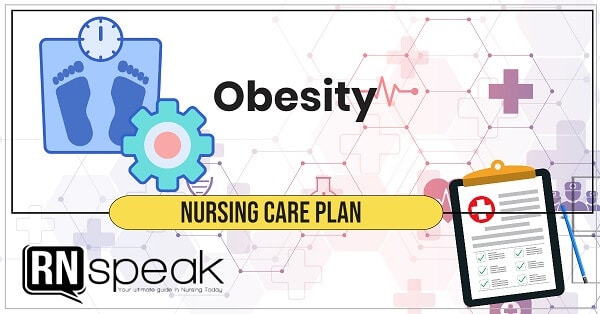Obesity is defined as an abnormal increase of fat in the subcutaneous connective tissue. This means a lot of fat cells are gathered in the tissue under the skin. Eating greater amounts of food than the body can use for energy causes this deposition. In 2010, around 43 million children under five were overweight. Once considered a high-income country problem, overweight and obesity are now on the rise in low- and middle-income countries, particularly in urban settings. Close to 35 million overweight children are living in developing countries and 8 million in developed countries
Evidence is now emerging to suggest that the prevalence of overweight and obesity is increasing word wide at an alarming rate. Both developed and developing countries are affected. Moreover, as the problem appears to be increasing rapidly in children as well in adults, the true health consequences may only become perceivable in the future.
NURSING PRIORITIES
1.Assist patient to identify a workable method of weight control incorporating healthful foods.
2.Promote improved self-concept, including body image, self-esteem.
3.Encourage health practices to provide for weight control throughout life.
DISCHARGE GOALS
1.Healthy patterns for eating and weight control identified.
2.Weight loss toward desired goal established.
3.Positive perception of self verbalized.
4.Plans developed for future weight control.
5.Plan in place to meet needs after discharge.
NURSING DIAGNOSIS:Nutrition: imbalanced more than body requirements
May be related to
- Food intake that exceeds body needs
- Psychosocial factors
- Socioeconomic status
- Possibly evidenced by
- Weight of 20% or more over optimum body weight; excess body fat by skinfold/other measurements
- Reported/observed dysfunctional eating patterns, intake more than body requirements
Desired Outcomes
- Identify inappropriate behaviors and consequences associated with overeating or weight gain.
- Demonstrate change in eating patterns and involvement in individual exercise program.
- Display weight loss with optimal maintenance of health.
Obesity Nursing Care Plans (NCP)-Nutrition: imbalanced more than body requirements
| Actions / Interventions | Rationale |
| Review individual cause for obesity, e.g., organic or nonorganic. | Identifies/influences choice of some interventions. |
| Implement/review daily food diary, e.g., caloric intake, types and amounts of food, eating habits. | Provides the opportunity for the individual to focus on/internalize a realistic picture of the amount of food ingested and corresponding eating habits/feelings. Identifies patterns requiring change and/or a base on which to tailor the dietary program. |
| Discuss emotions/events associated with eating. | Helps identify when patient is eating to satisfy an emotional need, rather than physiological hunger. |
| Formulate an eating plan with the patient, using knowledge of individual’s height, body build, age, gender, and individual patterns of eating, energy, and nutrient requirements. Determine which diets and strategies have been used, results, individual frustrations/factors interfering with success. | Although there is no basis for recommending one diet over another, a good reducing diet should contain foods from all basic food groups with a focus on low-fat intake and adequate protein intake to prevent loss of lean muscle mass. It is helpful to keep the plan as similar to patient’s usual eating pattern as possible. A plan developed with and agreed to by the patient is more likely to be successful. |
| Emphasize the importance of avoiding fad diets. | Elimination of needed components can lead to metabolic imbalances, e.g., excessive reduction of carbohydrates can lead to fatigue, headache, instability/weakness, and metabolic acidosis (ketosis), interfering with effectiveness of weight loss program. |
| Discuss need to give self permission to include desired/craved food items in dietary plan. | Denying self by excluding desired/favorite foods results in a sense of deprivation and feelings of guilt/failure when individual “succumbs to temptation.” These feelings can sabotage weight loss. |
| Be alert to binge eating and develop strategies for dealing with these episodes, e.g., substituting other actions for eating. | The patient who binges experiences guilt about it, which is also counterproductive because negative feelings may sabotage further weight loss efforts. |
| Identify realistic increment goals for weekly weight loss. | Reasonable weight loss (1–2 lb/wk) results in more lasting effects. Excessive/rapid loss may result in fatigue and irritability and ultimately lead to failure in meeting goals for weight loss. Motivation is more easily sustained by meeting “stair-step” goals. |
| Weigh periodically as individually indicated, and obtain appropriate body measurements. | Provides information about effectiveness of therapeutic regimen and visual evidence of success of patient’s efforts. (During hospitalization for controlled fasting, daily weighing may be required. Weekly weighing is more appropriate after discharge.) |
| Determine current activity levels and plan progressive exercise program (e.g., walking) tailored to the individual’s goals and choice. | Exercise furthers weight loss by reducing appetite; increasing energy; toning muscles; and enhancing cardiac fitness, sense of well-being, and accomplishment. Commitment on the part of the patient enables the setting of more realistic goals and adherence to the plan. |
| Develop an appetite reeducation plan with patient. | Signals of hunger and fullness often are not recognized, have become distorted, or are ignored. |
| Emphasize the importance of avoiding tension at mealtimes and not eating too quickly. | Reducing tension provides a more relaxed eating atmosphere and encourages more leisurely eating patterns. This is important because a period of time is required for the appestat mechanism to know the stomach is full. |
| Encourage patient to eat only at a table or designated eating place and to avoid standing while eating. | Techniques that modify behavior may be helpful in avoiding diet failure. |
| Discuss restriction of salt intake and diuretic drugs if used. | Water retention may be a problem because of increased fluid intake and fat metabolism. |
| Reassess calorie requirements every 2–4 wk; provide additional support when plateaus occur. | Individual intake can be calculated by several different formulas, but weight reduction is based on the basal caloric requirement for 24 hr, depending on patient’s sex, age, current/desired weight, and length of time estimated to achieve desired weight. Note: Standard tables are subject to error when applied to individual situations, and circadian rhythms/lifestyle patterns need to be considered. |
| Provide medications as indicated:Appetite-suppressant drugs, e.g., diethylpropion (Tenuate), mazindol (Sanorex), Sibutramine (Meridia); | May be used with caution/supervision at the beginning of a weight loss program to support patient during stress of behavioral/lifestyle changes. They are only effective for a few weeks and may cause problems of addition in some peopl |
| Hormonal therapy, e.g., thyroid (Euthroid), levothyroxine (Synthroid); | May be necessary when hypothyroidism is present. When no deficiency is present, replacement therapy is not helpful and may actually be harmful. Note: Other hormonal treatments, such as human chorionic gonadrotropin (HCG), although widely publicized, have no documented evidence of value. |









[…] https://rnspeak.com/obesity-nursing-care-plans/ […]
There is always in increasing trend in obesity these days as more and more people turn into a sedentary lifestyle.